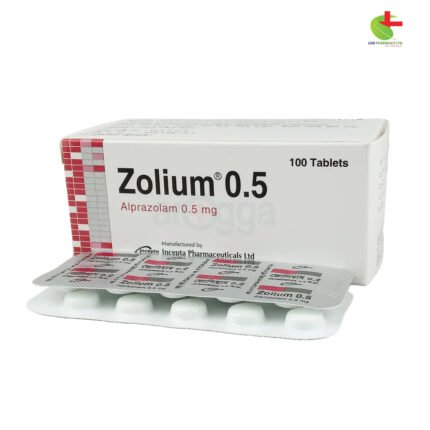Zolium 0.25
20.00৳ Strip
- Zolium contains Alprazolam and effectively manages anxiety disorders, panic disorders, and anxiety linked with depression.
- It enhances the effects of GABA in the brain, providing relief from excessive worry and tension.
- Follow a healthcare professional’s guidance for safe dosage and administration.
- Always consult a physician before starting or discontinuing treatment.
 Brand
Brand
|
Incepta Pharmaceuticals Ltd |
|---|---|
 Generics
Generics
|
Alprazolam |
 Type
Type
|
Tablet |
Indications
Zolium is prescribed for:
- Anxiety disorders
- Short-term relief of anxiety
- Anxiety linked with depression
- Panic disorders, with or without agoraphobia
Always consult a registered healthcare professional before taking medication.
Pharmacology
Alprazolam, the active ingredient in Zolium, belongs to the 1,4-benzodiazepine class and acts as an anxiolytic, exhibiting hypnotic and anticonvulsant properties. It is believed to exert its effects by interacting with the Gamma Aminobutyric Acid (GABA)-benzodiazepine receptor complex. Like other benzodiazepines, its central nervous system (CNS) depressant activity varies by dosage, leading to effects ranging from mild impairment to complete sedation.
Dosage & Administration
Initiate treatment with 0.25 to 0.5 mg taken three times daily. Based on patient response, the dosage may be increased at intervals of 3 to 4 days, with a maximum increase of 1 mg/day. The total daily dose should not exceed 4 mg. In certain cases of panic disorder, dosages may reach up to 10 mg daily, necessitating regular reassessment and potential dosage adjustments.
Tailor the dosage to achieve the best therapeutic effect with the lowest effective dose. If side effects occur at the initial dosage, consider reducing the amount. When discontinuing treatment, gradually taper the dosage by no more than 0.5 mg every three days.
For elderly patients or those with advanced liver disease, begin with 0.25 mg, taken two to three times daily, with gradual increases as tolerated.
Patients switching from 0.25/0.5 mg formulations to 1 mg should take the latter once daily, ideally in the morning. Tablets should be swallowed whole and not chewed, crushed, or broken.
Always consult a registered healthcare professional before taking medication.
Interaction
The CNS depressant effects of Zolium may be intensified by concurrent use of other psychotropic medications, anticonvulsants, antihistamines, alcohol, and oral contraceptives.
Side Effects
Most side effects occur early in treatment and typically resolve with continued use. Common side effects include drowsiness and light-headedness, while others may include depression, headaches, confusion, dry mouth, and constipation.
Pregnancy & Lactation
Alprazolam falls under pregnancy category D, indicating it should be avoided during pregnancy. Additionally, like other benzodiazepines, Alprazolam may be excreted in breast milk; therefore, breastfeeding is not recommended for mothers using this medication.
Precautions & Warnings
Due to the potential for psychological and physical dependence, any dose adjustments or abrupt discontinuation of Zolium should only occur under medical supervision. The duration of therapy should be determined by a healthcare professional. Caution is advised for patients with liver or kidney issues, chronic respiratory conditions, or sleep apnea.
Use in Special Populations
The safety and efficacy of Zolium in individuals under 18 years have not been established.
Overdose Effects
Signs of Zolium overdose may include extreme drowsiness, confusion, impaired coordination, reduced reflexes, and coma. In cases of overdose, provide general supportive care along with immediate gastric lavage.
Therapeutic Class
Benzodiazepine sedatives
Storage Conditions
Store below 30°C, away from light and moisture. Keep out of reach of children.













Reviews
There are no reviews yet.